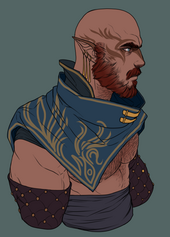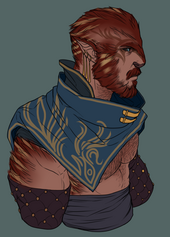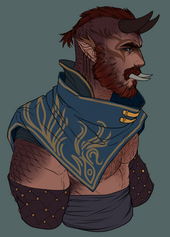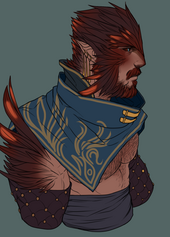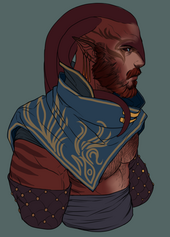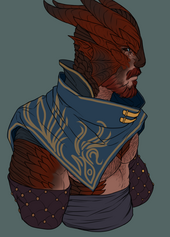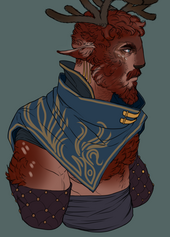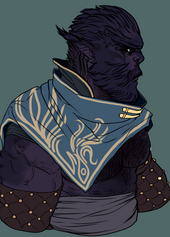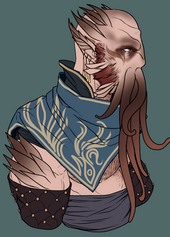More actions
No edit summary |
|||
| Line 45: | Line 45: | ||
* Maquixtl can analyze blood to understand the genetic make-up of something, or discover inherited genetic traits or faults. | * Maquixtl can analyze blood to understand the genetic make-up of something, or discover inherited genetic traits or faults. | ||
* Maquixtl have extremely sharp eyesight, capable of detecting the author of any written work, if they have read the author's writing before. | * Maquixtl have extremely sharp eyesight, capable of detecting the author of any written work, if they have read the author's writing before. | ||
* Maquixtl | * Maquixtl may choose one Mechanic from either the Ailor, Fin'ullen, or Eronidas Heritage Traits as a form of personal Genos Editing. | ||
===Gene Editing=== | ===Gene Editing=== | ||
Revision as of 21:18, 4 February 2024
| Maquixtl | |
|---|---|
 | |
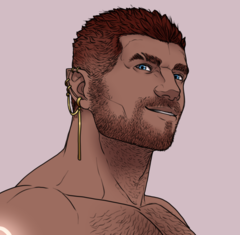 | |
| Nation State | Tlan Iuitletl (Chantli only) |
| Ruler | Emperor Suel (Chantli only) |
| Other Present | Sovereign |
| Languages | Nātl, Altalar |
| Religion | Estelley, Dragon Worship |
| First Recorded | 50 BC |
| Demonym(s) | Maquixtl |
The Maquixtl (pronounced Ma-kwee-still, sometimes called Maquis by the Ailor) are a Race of Elves that used the power of science to rid themselves of their Magic addiction and decadence during the fall of the Allorn Empire, but then split on their attitudes on how to transform society afterwards. They are an incredibly versatile Elven Race that uses Life Magic and genetics to enhance themselves or their lifestyles, while spreading their views on world-balance, racial-tolerance, and religious diversity. In many ways, the Maquixtl represent those Elves that desire change, to let go of the past, and to learn from mistakes made to find a better way to live. Their societies are an equal mix of knowledge and science focus, cottage core aesthetics, and the traditional forest-elf design, depending on which community is interacted with. There exist vibrant communities of Maquixtl in Regalia, with notable presence of Estelley priests, Maquixtl mercenaries, and Dragon Worshipers having come to the east to share in the lore of the Dragons and stepping out of their isolated Guldar homeland.
Subgroups
The Maquixtl are sub-divided over three distinct groups, each following a different Prophet of the Cult of Genos. These leaders, once united in their desire to rid the Elves of their dependence on Magic, all turned to different paths after they broke free from the Allorn Empire, their individual ideologies no longer able to be kept in communion. Each Maquixtl is a member of one of these subgroups, but generally speaking all Maquixtl get along very well with each other. While there is ideological differences, their common unifying rejection of the Allorn heritage overrides any animosity that could be gotten from their conflicting ideals. While this section gives some general ideas for why a Maquixtl would want to come to Regalia when they have a world of their own in the West, the section further down referring to Allorn Relations, delves in greater detail why there is a large migration wave of Maquixtl from Guldar, Westwynd and Altaleï to the Regalian Empire.
- The Chantli Maquixtl are Suel's followers, who traveled west to Guldar to create a Maquixtl state as an Empire, with Suel as Emperor, and their own nobility below that. The Chantli are urban Meso-American styled Elves who favor science and the natural forces of Aloria. Chantli Maquixtl that go to Regalia to seek knowledge, explore the world, or to be in a place where all Maquixtl can exist without Allorn repression.
- The Xotik Maquixtl are Ramvaal's followers, who traveled south to form forest communes devoid of statehood, and most aggressively rejected nationhood, autocracy, or even any form of formal government structure. They live deep in nature in harmony with the Yanar without earthly connections, acting as forest protectors reminiscing of Wood-Elves. Xotik Maquixtl traveling to Regalia often seek to encourage environmentalism, or assistance against Allorn encroachment.
- The Sentli Maquixtl are Ceylenn's followers, who stayed in the Plains, believing in a rejection of Suel's autocratic principles, but believing Ramvaal went too far by rejecting all heritage and culture in favor of the forest. The Sentli live in windswept plains, building communes around vast windmills and approaching elven cottage-core aesthetics while favoring strong democracy, abolitionism, and freedom for all. They often travel to Regalia to get away from Allorn encroachment.
It should be noted that these societal splits aren't absolute. Despite having started out this way, people move around, and its entirely possible for a Sentli Maquixtl to have opened up a medical healing shop in Guldar among Chantli Maquixtl, or for a group of Chantli Maquixtl to travel to a Sentli commune to protect them from Eronidas raiders. People move around, these distinctions only describe visual vibes.
Design
The Maquixtl are an Elven Race, meaning they have a general humanoid appearance, with pointy ears. Unlike many of the other Elven Races however, most Maquixtl have more rough or rounded appearances than their gaunt or sharp featured Lanlath or Kathar cousins. The most notable distinction about the Maquixtl, is that they have a medium dark skin-tone, with a reddish or olive-like shade to it, refer to THIS IMAGE for skin tone references. The Maquixtl have a wide range of hair colors available from a warm black to brown, blonde, and even graying with age. The most common hair color however is found within the reddish/red-brown range, most commonly mahogany-like. Eye colors can range from brown to blue and green, with a rare few showing gray. Unlike the other Elven Races, the Maquixtl don't lean physically one way or the other (lithe or big). Their Race has a great range of physical capabilities, because of their Gene-Editing culture and capability, allowing them to change their own body without the use of Magic. As such, Maquixtl can be large (as large as Eronidas!) or small and lithe. Maquixtl, like all other Elves, are long-lived, living to around 500 years old, and being able to physically control how old they look, thus staying young (or old) looking forever.
Why Maquixtl in Regalia
Why Maquixtl in Regalia is a section designed to give (new) Players some idea for why a Race might want to be in Regalia, as opposed to their homeland, as some Races are heavily homeland-coded and may need some contrivances to actually Roleplay in Regalia, where all the on-server activity takes place. While you can usually extrapolate other reasons from the Lore on this page, this section provides a few easy-access suggestions.
- Center of Learning: As much of Maquixtl society is centered around the idea of learning both in the literal sense of knowledge, but also in self-exploration and better understanding of the self, Regalia affords a unique location in the world where information and diversity come together like nowhere else, while also all Genos Editing needs are answered by Regalian imports and zoos.
- Escaping Allorn: Particularly the Xotik and Sentli suffer greatly from Allorn enrcroachment. Since the Teledden re-proclaimed the Allorn Empire, they have started burning Sentli villages and imprisoning Xotik Maquixtl as forest fanatics, driving some even into slavery. Regalia as an anti-slave state with open borders, allows the Maquixtl to live free from Allorn dangers.
- Environmentalism: Many Sentli and Xotik are concerned about the industrial progress in Regalia, particularly how it seems to be going at the expense of nature and environmental preservation. These Maquixtl travel to Regalia to try and teach Regalians and other people living there respect for nature and harmony with resources in sustainability.
- Personal opportunity: Whether due to the choking of Chantli aristocracy, or the lack of industrial and financial opportunities in Xotik and Sentli communities, Regalia is the world center of business and commerce. Maquixtl who care more for the personal pleasures of life leave the financial backwaters of Maquixtl societies, and travel to Regalia to make bang for buck.
- Protecting Manaseia: There is some evidence that both of the Maquixtl patron gods interact a lot with Regalia, or more specifically the lands it owns, resulting in Mana and Aseia worshiping communities springing up all over the Regalian Empire, with migrants traveling in to add to these existing communities and fortify them to seek out the Arken.
Heritage Traits
When designing a Character, Proficiency Points allow for a limited Ability selection with Point Buy Packs. Heritage Traits adds free Packs and Mechanics on top of that to help with cultural themes. Free Packs grant Abilities usually, while Mechanics change the way a character functions in Roleplay through subtle, and usually out of Combat ways. In essence, Mechanics just add aesthetic flair that invest in the niche of each culture. Free Packs never raise Proficiency Points, but the character must be able to purchase them normally. (ex. if a character is a certain Affinity that locks them out of a category, they cannot take that specific free pack and must choose the alternative option.) If a Free Pack grants Magic of some type, that Magic can be of any Alignment the character can normally choose, or limited to a select alignment, which will always be written in the Free Pack description.
Mixed Heritage characters (i.e. characters born from two parents of different Cultures) may take one parent's 'Free Packs' and mix and match up to 5 Mechanics from both parents, although some Peoples cannot produce Mixed Heritage children (due to Magical/Fantasy reasons). Gene Editing is available to Mixed Heritage Characters who take the Maquixtl Free Packs.
Free Packs
- Maquixtl can choose one Athletic, or Magic, or Chem Pack for free, either as Mundane, Exist Magic, or Dragon Magic Alignment.
- Maquixtl can choose another Athletic, or Magic, or Chem Pack for free, either as Mundane, Exist Magic, or Dragon Magic Alignment.
Mechanics
- Maquixtl can (with OOC consent) read emotions from other Characters, and suppress their own from being read.
- Maquixtl pets live unnaturally long lives, with them being able to apply Gene Editing on their pets to modify them.
- Maquixtl can analyze blood to understand the genetic make-up of something, or discover inherited genetic traits or faults.
- Maquixtl have extremely sharp eyesight, capable of detecting the author of any written work, if they have read the author's writing before.
- Maquixtl may choose one Mechanic from either the Ailor, Fin'ullen, or Eronidas Heritage Traits as a form of personal Genos Editing.
Gene Editing
One major aspect of Maquixtl culture (predominantly Chantli, less so for Xotic and Sentli) is their ability to use a form of Life Magic to analyze and incorporate the genetic makeup of other creatures into their own genetic source, as a mechanic. As a result, Maquixtl can create mutations that aren't harmful (like Void or Exist mutations tend to be), and can incorporate various traits and functions of the bodies of these creatures onto themselves to make up for shortcomings in the Elven body, or just for aesthetic reasons. The list presented gives a general overview of all the individually available Genes. A person can choose to stay Default, incorporate only one type of Gene, or mix multiple Genes together. Additionally, Maquixtl can also perform Gene Splicing on other Races, taking on minute aspects of them. For example, a Maquixtl can incorporate Eronidas tusks, Isldar white hair, Qadir arm tattoos, Songaskian Dragon horns, etc, but these must always be minor and never approach a Disguise, or radically make a character no longer recognizable as Maquixtl. Maquixtl can change all of these aspects on the fly, mid-combat, and retain them for as long or short as they like. None of the Genes grant Combat Functions, though some may grant some aesthetic flairs where expressed.
|
|
|
|
|
|
|
Avarr and Avarr Unity
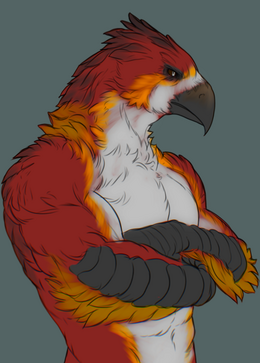
A final mechanical ability that the Maquixtl have, is to share their body with an additional soul. The Avarr were a Race of Terror-Bird-like (Phorusrhacidae, but with shorter beaks) humanoids that were killed some long time ago under mysterious circumstances. Despite the collapse of their civilization, many of the souls of the Avarr were preserved by the Dragon Caius who saw them as his favored champions in Soul Cairns. The Maquixtl (particularly the Chantli) who traveled to Guldar, in essence inhabited the ruins of their civilization (as the Eronidas seemingly lacked urban housing) and took up much of their old culture. Eventually, with the guidance of Caius, the Maquixtl learned how to commune with the Soul Cairns, and were able to house the souls of the dead Avarr in their own bodies as secondary passengers. This process is very similar to Spirit Remnants, but not exactly, because they aren't "dead", they are also unable to exist outside of a Soul Cairn or host. Avarr souls demand some explanation: Avarr culture itself was brutally warlike, violent, cruel, and chaotic. The Avarr as a result are often violent, know-it-all, and vain people. The Maquixtl accept these soul passengers even with potential turmoil in their own bodies for two reasons: they have absorbed much of Avarr culture, and part of a repayment to their influence, is to letting their cultural forebearers live a second life in a new host body, to see and experience the world through new eyes. The second reason is that not all Maquixtl are proud, strong willed, and confident, and a shy or meek Maquixtl's personality can sometimes be made more extrovert or bold by adding an Avarr. The choice is always entirely based on consent, and the Maquixtl travel to Guldar to absorb a Soul Cairn to house a second soul in their body. This has several consequences:
- Avarr Control: Having a second Soul that has equal theoretical control, means that sometimes they can lose control to the Avarr soul altogether. This can also happen voluntarily, or they can both be active at the same time, or in some cases, a Maquixtl may earn the respect and cooperation of the Avarr and only take control when permitted.
- Avarr Legality: Having only an Avarr soul is legal in Regalia due to a legal exception, though engaging in any other summoning of Spirits is not legally allowed for the Maquixtl. They are still responsible for any damage inflicted on people or buildings in case the Avarr takes control and goes on a rampage.
- Avarr Stories: There are a great many narrative stories to tell with Avarr souls, from an enraged Avarr who disapproved of their new host, to an Avarr who forms a perfect harmony with their host. How these Avarr function, is entirely up to the player.
- Avarr Memories: Avarr only remember their name, their personality, and vague memories of the past. We have hopes of writing out Avarr History in the future, so that this can be expanded upon, but for now, all Avarr entities suffer from complete amnesia.
- Avarr Transformation: Finally, having an Avarr soul, allows the Maquixtl to transform partially or wholly into the body of a full Avarr, either by letting the Avarr soul take over or doing it themselves. For reference what this would look like, see art on the right. This is not a disguise.
History
The Maquixtl descend from Allorn Teledden and Fin'ullen who rejected the decadence and corruption of Magic in the Allorn Empire, and joined forces with the Cult of Genos, an Elven Cult dedicated to research genetics and Life Magic. When the Allorn Empire fell, the Maquixtl underwent an event called The Siphoning, during which hundreds of thousands of Elves, researchers and their families who were members of the Cult of Genos, agreed to evolve to rid themselves of the Magical infection that had destroyed their Empire. The Cult of Genos was led by Suel, his wife Ceylenn, and their husband Ramvaal, all three immensely powerful Life Magic Mages (making them also exceedingly rare). The three leaders of the Cult of Genos used their considerable Magical powers to change the bodies of their followers, allowing them to focus more on their own capabilities than having to rely on Magic, while also siphoning much of their Magic away from them. While The Siphoning was a great success, the rapid decline and collapse of the Allorn Empire had rushed the plans of the three leaders of the Maquixtl, meaning they had not yet agreed on what to do after The Siphoning. The urgency of departing from the ruins of the Allorn Empire where civil war and barbarism was quickly becoming a daily occurrence, forced Suel on a quick departure west, where his followers would found the Maquixtl State on Guldar.
His spouses Ceylenn and Ramvaal disagreed with Suel's intentions to maintain aristocracy and autocracy, believing Suel did not take The Siphoning far enough, and kept the same corrupt aristocratic systems of the old Empire alive, and thus they and their followers were left behind. Ceylenn and Ramvaal would initially work together, but the arrival of the Yanar complicated their relation as well. Ceylenn had in the meantime founded the Sentli Communes, small villages and townlets built around windmills that were centers of communal care and hospitality, bringing for the first time abolitionism and democracy to the Elves, but refusing to let go of Allorn history of culture beyond governance and Magic, and more importantly honesty and observance of all religious gods of Estelley. Ramvaal instead agreed with the Yanar that the only way to fully purge the rot of the Allorn Empire from themselves, was to leave all remnants of Allorn history behind, including all the art, the language, the traditions and customs, but most importantly, the lessons of Cemaan the Goddess of the Teledden. Ramvaal and his followers left the Sentli Communes, and traveled far south to the Lessarion forests on the border of the Selevaan nation, where they would build communes in the forest where they lived with the Yanar around Mana Trees, eventually attracting other Elves who abandoned their urban lifestyle to live in the forest in harmony with nature. This represents the present three-way split between the Maquixtl. While they are physically all the same, their cultures and thoughts on the world around them differ.
Language and Naming
The Maquixtl language is called Nātl, which is largely based off reverse engineered Avarr language, and as such completely detached from the Elven languages. That being said, all Maquixtl can still speak Altalar (the main Elven language), and many Xotik and Sentli villages in fact only speak Altalar because they have had very little interaction with the Chantli in Guldar. The Nātl language is absed off the real-world Nahuatl language, with names also being based off this language. Keep in mind that Minecraft font may not support complex accents of the Nahuatl language, so even if the correct way of spelling would include them, it is recommended to leave them be when referring to a Character's name on a Character Application or by using the in-game Nickname system. It is also recommended not to use excessively long names. Due to the way consonants flow in Nahuatl, long names tend to become unpronounceable for anyone who does not have a degree in Nahuatl studies. It should also be noted that not all Maquixtl have Nātl names, some still defer to Elven naming (general Elven fantasy naming, but avoiding Tolkien Elven). Many Maquixtl also have two names, their Nātl name used for family and friends, and their Altalar name used for public engagements and towards strangers until trust can be earned.
Conflicts
A lot of MassiveCraft's lore is constructed around conflicts that are based on religious, historical, or societal grievances. This section aims to set out the various conflict points for this Race, while also attaching some nuance, so that there is wiggle-room for players to not get stuck in endless loops of arguing the basics of societal conflict without clear Character Development or Resolution.
- Conflictfree: The Maquixtl are, surprisingly enough, completely devoid of conflict, save for their national animosity towards the Teledden who support the Allorn Empire's occupation of Maquixtl inhabited lands, or the vague testiness of Eronidas about their habitation in Guldar (which they cannot live in anymore because of the toxic fumes, but still have some historical claim to). Maquixtl as a Race are barely 400 years old, which in terms of Elven lifespans, is barely a single lifespan. Not enough time has passed for them to generate societal conflicts.
Religion
Maquixtl Society is split fairly evenly between Dragon Worship and Estelley worship, with a heavier lean towards Dragon Worship among the Chantli, and a heavier lean to Estelley among Sentli, and almost exclusive Estelley worship among the Xotik (there are so many Chantli that they make up the difference with the Xotik and Sentli). The Maquixtl have two patron deities in Estelley specifically for them: Aseia and Mana, who were once together Manaseia, but split in two different Gods when Maquixtl society broke on ideological lines. Maquixtl Dragon Worshipers often have a strong preference for Caius, who resides in Guldar with them, and also controls the majority of the Dragon Sites there. Many Maquixtl are Red Hunter Archon, though Maquixtl who worship other Dragons also exist, especially when they have been exposed to the outside world more and aren't strictly cooped up in Guldar exposed to constant reinforcement of their ideology.
Dragons in Guldar
Guldar is home to the Red Dragons, the most fanatical purist purging of Magic Dragons in existence, and yet, Mages exist in Maquixtl society in defiance of the extermination orders of Caius, the leader of the Red Dragons. This is because of a cultural notion called the "Red Truce". The Red Truce is a concept held by the Red Dragons (and by extension their Matron and worshipers and Archon), that while the Occult should generally be purged, that in some places or instances, going ton a purging rampage can actually be self harming. One such instance, is the existence of Magic in Maquixtl society. If the Maquixtl were to turn hostile to Mages overnight and start purging their own Mage populations, civil war would erupt, and the Dragons would have to contend with internal strife before even being able to strike out externally. As such, Maquixtl Archon and Dragon Worshipers never go after Maquixtl Mages, as they have been declared "Off-limits", by the Matron of the Red Dragon, who is a Maquixtl Chantli in Guldar. Some Red Hunters may still go after them, but Maquixtl Dragon Worshipers are generally encouraged to stop this from happening. The Red Truce can also be applied by Red Hunters in other instances, where attacking everyone on sight would be self-harming, and sabotage the divine mission they are on. All in all, Dragons exist in relative peace despite the existence of Magic in Maquixtl society.
Maquixtl Magic
The Maquixtl have a somewhat complicated relationship with Magic. It's not accurate to say that Maquixtl are outright anti-Magic despite them having been cleansed of all Magic nearly 400 years prior to the modern day. It is true that at one point in time they were "purist", however the Maquixtl have both made peace with and can celebrate the fact that, even if society is cleansed of all Magic, Mages will continue to be born in the future due to the random Mageborn seeding of souls that cannot be predicted or prevented. While Maquixtl society is strongly dominated by science and knowledge pursuits, Magic does exist, and it is not shunned. That being said, because of how little investment there exists in Magical training, Mages often have to rely on eccentric tutors if they are born with Magic, while extremely few Maquixtl go out of their way to actually learn Magic while not being born into it. This is also why many Maquixtl travel to Regalia, which has much better Magic schools, that aren't tainted with Teledden ideology from the west.
Fashion
Maquixtl fashion is born from a combination of Aztec and Maya traditional clothing from pre-Colombian times (adopting patterns, colors, and some invidual pieces) while adding high-fantasy Elven clothing or using said clothing as a base. A common feature could be for example a Tilmàtli (Tilma/Aztec cape), or Huipil (loose fitting tunic). However, because of climate acclimation, many Maquixtl also wear robes of silk or complex leather harness outfits that have a more tribal appearance. Maquixtl hair styles are very varied, with mohawks particularly common among the so-called Ullaren Maquixtl, who are nomadic and roam around on horseback. Literal Meso-American clothing is perhaps a little inappropriate for the clothing standards of Regalia, so creative combinations and synergies are encouraged. Jewelry carved out of jade is very commonly used by the Maquixtl, usually in the shapes of various animals from Guldar like the jungle giant boa, the flying water serpent, or the great apes. Much like their hair colors and skin-tones, ochre-dominated pigments are common, in combination with orange or yellow, though very colorful outfits including blue and green are also found.
World View
- It is a deep cultural taboo to ridicule a Genos state, or to insult another Maquixtl for their choice of Genos state, including Default Genos. Freedom to define one's own body and to have bodily autonomy is a very important aspect of Maquixtl culture.
- The Chantli have famous warrior lodges, militant monastic orders that are comparable to Regalian knighthood in their scope. Naming themselves after the creatures of the jungle, these Brotherhoods are extensively well armed and trained, and a force to be feared.
- Maquixtl have a very extensive education system, especially at the higher level, based on patronage. Master-student relationships are very strong, and the close friendships formed between teachers and their three to four acolytes goes an entire lifetime.
- Maquixtl architecture and design is unlike anything else in the world. Combining Avarr pyramids, hanging gardens and open archways with an Elven sense of grandeur, chiseled carvings and statues, the great cities of Guldar are the topic of much mystique among Regalian so-called Occidentalist painters, who are an entire movement dedicated to the admiration of Elven works.
- The Maquixtl are quite close with the Yanar, who they are able to bring to Guldar with them. Especially the Sentli and Xotik, who see in them kindred spirits, do the best they can to keep a few Yanar in their vicinity to hang around with since they are so close.
- The Maquixtl love feasts as a social event. For Sentli, the act of cooking is a bonding experience and many communal kitchens are set both within Guldar and in plains colonies. Villages especially enjoy using feasts as a way to spread local gossip, or engage in scheming.
- Maquixtl Archon consider it a necessary pilgrimage to summit the approaches of Mount Vestor, the volcanic home of Caius, at least once in their lifetimes. It is called “making the ash,” with a ritual at the end where the warrior dirties their forehead with the soot of Caius’ mountain and returns home without washing it off, to prove that they have stood where he stood.
- Maquixtl alternate between using metal and sharpened obsidian weapons. The former for regular armed conflict, usually spear and shield but sometimes chopping sword or axe, the latter for more ceremonial purposes, usually clubs with sharpened pieces bound between wooden slats.
- Maquixtl do not just compete by combat, and have a love for competitive sports between city-states and settlements. These are usually lifted from other cultures with some modifications to the rules to allow for complete use of Genos States, creating games that are as alien as they are explosive.
- Many adventurers attempt to use masks or suits to enter Guldar, only to perish shortly after exposure to its toxic air that is actually not mundane but Magical in origin, not affecting Yanar and Maquixtl only. Maquixtl sometimes pick this fallen equipment off the shoreline as souvenirs.
- Most Teledden look down their noses at the Maquixtl as strange, misguided Elves led off course by a radical. Despite this, their martial prowess rivals that of the Fin’ullen, and Maquixtl mercenaries performing services for Teledden and Fin’ullen nations were not unheard of prior to the return of the Allorn Empire.
- The Maquixtl have not just altered the Genos of themselves and local animals in Guldar, but also certain plantlife, creating unique produce, and allowing existing crops to develop in unique ways oftentimes nearly doubling their productivity.
- Maquixtl Gene Splicing also has a dark side. A Maquixtl who Gene Splices so much that they lose humanoid characteristics, eventually ends up of lesser-intelligence and may even lose sentience altogether, becoming merely a wild animal and no longer being able to turn back.
Trivia
- The Maquixtl have gone so far in their appropriation of Avarr culture that the Teledden like to deride them as Avarr role-players behind their backs, a sure-fire way to make other Teledden smile smugly, and to make a Chantli start sharpening their axe.
- The Maquixtl are fond of animal iconography, using it to decorate their brightly colored cotton clothes and as inlays on their weapons. The serpent, the Mantavaar and the Silat Wolf as well as more fantastical creatures, are all common finds.
- The Maquixtl state does not have a formal ambassador in Regalia. This is because the Maquixtl state is so far away and isolationist, that generally speaking it does not want or act in any way that impacts the wider world, thus not necessitating diplomatic contact.
| ||||||||||||||||||||||
| Accreditation | |||||||||
|---|---|---|---|---|---|---|---|---|---|
|
| ||||||||
